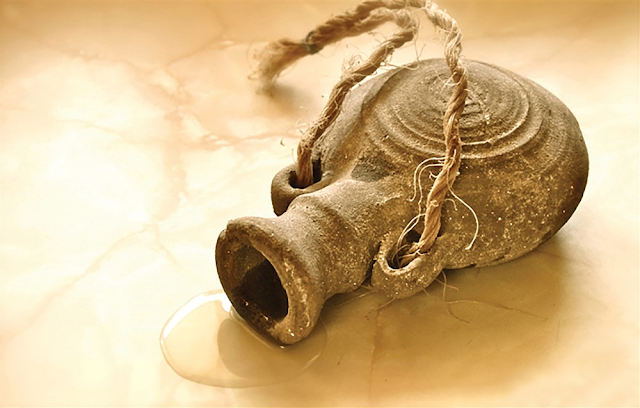Prodigal people
John 12: 1-8
New Ark United Church of Christ, Newark, DE
April 3, 2022
 |
| Photo of an ancient stoneware vessel on its side with clear liquid spilling out onto the floor. |
The word “prodigal” has been misunderstood for probably as long as there has been a story called “The Prodigal Son”. From that context most people assume that prodigal means someone who has strayed or done something hurtful, who now feels remorse for what they did and has returned for forgiveness. In truth the word prodigal means reckless or wasteful extravagance, to squander, to lavish, as in “my cup runneth over” or a sower scattering seed everywhere or a merchant selling all that they had to purchase a pearl of great price or a field that held a hidden treasure.
Or Mary with her jar of perfume made from pure nard. The word ‘nard’ comes from spikenard, a flowering plant in the honeysuckle family that grows in the Himalayas of China, India, and Nepal, which explains why it is so costly. Its rootstalks can be crushed and distilled into a deeply fragrant, amber-colored essential oil, very thick in consistency. It was a luxury item in the ancient world, something that would be used to anoint the head of a king, not the feet of a poor itinerant rabbi. To anoint the feet would be part of preparing a body for burial. And to wipe Jesus’ feet Mary lets down her hair, something a woman would do only for her husband or in grief.
It is the night before Jesus would enter Jerusalem for the last time and in John’s gospel, Mary is the prodigal one. Rather than spending her money on the poor, she spends it all on her poor friend. Rather than waiting until his burial, she shows the measure of her grief through her tender love for Jesus while he is alive. She pours out her love for him, the kind of love that would help Jesus do the hardest thing, the last thing he will ever do, a love that would later come back to her from a cross, from suffering and death.
We are not to withhold our wealth to anoint the dead but to squander it, lavish it on the living, on those who disrupt the status quo, our status quo, those who need care and tenderness, those who need to be loved into their future, especially an uncertain future, a future they cannot envision for themselves, especially a future that might be filled with suffering.
Often when we speak of those who are unhoused or who suffer from addiction or who are impoverished, we talk about wasted resources, money down the drain, as though theirs is a moral failing rather than a trauma response to a system designed to keep certain people at the bottom. When Jesus said the poor will always be with us, he was probably referring to a quote from Deuteronomy, chapter 15, verse 11: “Since there will never cease to be some in need on the earth, I therefore command you, ‘Open your hand to the poor and needy neighbor in your land.’” Homelessness, addiction, and poverty are not natural or accidental; they are manufactured. The system isn’t broken; it was designed that way.
We condemn how desperate people use their resources and yet the 735 billionaires in the U.S. whose wealth comes mostly from exploited people and resources go largely unnoticed. We protect wealth and property more than we protect the vulnerable. Lavishing resources on those who can never repay doesn’t entirely solve the problem, but it does shift the power and focus of who and what is of value and worth. Who are the openhanded, who are like Mary in our culture, who give lavishly, who are wastefully extravagant in their generosity? Who are like Judas, concerned with appearances while lining their own pockets? Who are the ones that serve up betrayal and desertion to the most vulnerable? Who are the ones who love without counting the cost?
Lest we forget, this Table is a prodigal one. It is a Table full of Jesus’ wastefully extravagant love for his friends who would betray and desert him. Jesus prays for them, cares tenderly for them, washes their feet, offers them a ritual meal of remembrance and forgiveness that still feeds us today. Jesus loved them into their unknown future and loves us into ours that we would have the strength and courage to do the same. The love of Jesus is neither reasonable nor excessive—it’s love, after all. We are called to be a prodigal people. We will only waste such love if we don’t squander it, if we don’t lavish it upon others, if we are not recklessly extravagant with our love, especially with those the world deems undeserving.
That’s why it’s called grace. That’s why it’s so amazing.
When we see
the body of Christ
still broken in this world,
may we meet it
with lavish grace
and pour out ourselves
with extravagant love.
Amen.




Comments
Post a Comment